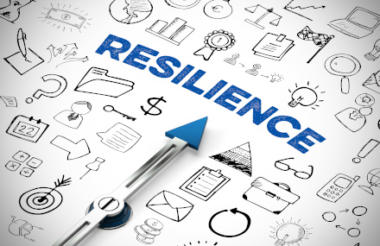Charities have had to try to remain strong through some extraordinarily difficult circumstances during the pandemic. But even pre-pandemic, charities faced a challenging operating and funding environment. Many experienced both increasing levels of demand and more competitive funding rounds, meaning that all their focus was on raising money and delivering services. The health of charities themselves, the scaffolding holding everything up, could not be a priority.
Almost no-one funds charities to step back from the day-to-day and devote time, energy and focus on improving their operations and building long-term resilience. Most donors expect the charities they support to be efficient and effective yet restrict their donations entirely to delivering impact, preventing those charities from focusing on organisational challenges as they emerge.
To address this, CAF ran a three-year Resilience programme, funded by individual philanthropists, to understand how charities could develop their resilience and recognise what difference that would make to their operations. We also wanted to understand what funders could do to better support charities with their long-term organisational health.
The initiative provided grant funding, bespoke advice and training to develop the resilience of ten small charities in a way that worked for them individually. The detailed findings from the CAF Resilience programme can be found in the recent Creating Resilience report.
We learnt that developing positive resilience is not easy and takes time. Whilst charity leaders are wholeheartedly committed to and passionate about improving things in our society, they need time to focus and plan for the future. They also need advice and support in specialist areas and time to absorb that learning.
We want the report to help other charities and inspire major donors to work on charity resilience issues, ensuring these amazing organisations can continue to make our communities better.
This is why we’re setting out three major asks:
1. For trustees
We’re calling on trustees to create a Resilience Designated Fund within their charity accounts. The purpose of the fund is to provide CEOs and other senior staff the necessary time to focus on the resilience of their organisations. It will also remind trustees and senior staff to take the future strength of their charity seriously – and become a standing item at board meetings.
How big should the fund be? For a small charity with a few staff, the director should be spending at least two days a month on resilience issues. Given the average salary of a small charity director, with a training budget added, that means a fund of at least £7,000 a year, obviously more in a larger charity.
2. For charity directors
We are also calling on charity directors to hold sacrosanct the time they should be focusing on the resilience of their organisations. We recognise the many challenges facing charity directors but resilience building cannot be something addressed only when other commitments allow. The fund we are proposing is there to resolve this.
3. For funders
Finally and crucially we are calling on funders to include explicit support for small charities’ Resilience Designated Funds when making a grant. We believe that if every grant maker allowed 15% of their grant to go towards a Resilience Designated Fund, it would generate the minimum £7,000 a year they would need.
The growing impact this would have in each charity would provide ample return on investment through the greater impact those charities would then have in the future.
Understandably, most funders have ordinarily focused on having immediate tangible impact. However, now’s the time to start investing in their future too. Let’s start having these conversations at board level, executive level and, crucially, with funders too.
Beth Clarke, is Programme Manager at CAF Resilience and Philip Spedding is Senior Manager, Advisory & Business Development at CAF
Related articles











